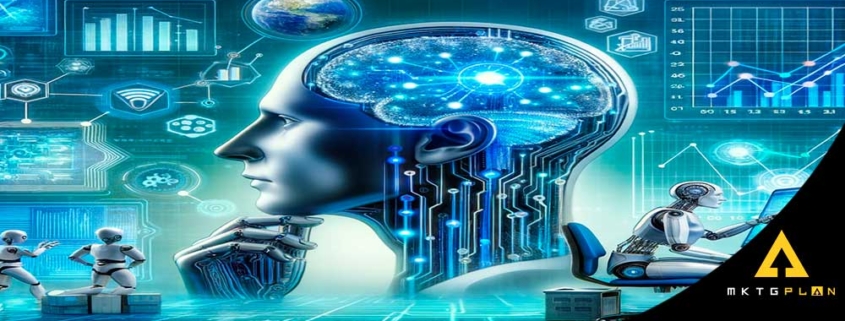Unlock the power of AI for SEO content creation: 5 practical examples
AI for SEO Content Development: An In-depth Analysis with Five Case Studies
Are you contemplating the integration of AI in your SEO strategy? Are you a seasoned SEO specialist seeking to revolutionize your content generation process? Or are you merely curious about the burgeoning use of AI in SEO? Regardless of your stance, the following examples of five companies successfully using AI for SEO will assuredly pique your interest.
1. LinkedIn’s Collaborative Articles
Boasting a reach of over 1.5 million users monthly, LinkedIn, the leading professional networking platform, initiated its collaborative articles program earlier this year. The articles use artificial intelligence algorithms to ignite discussions on a broad array of topics. Expert perspectives and input from the LinkedIn community enrich these AI-generated dialogues accordingly.
LinkedIn has sustained its relevance in the professional networking sector, attracting over 700 million visits monthly from search engines with its authoritative presence. Beyond traditional search engine optimization, LinkedIn utilizes novel strategies and tactics to enhance its web traffic. For instance, they introduced LinkedIn Pulse, an equivalent to a news and blogging platform for their users.
The collaborative articles on LinkedIn are exclusive to invited contributors, further amplifying the platform’s credibility to Google’s Expertise, Authoritativeness, and Trust (E-A-T) assessment criteria. Contributors are conferred with a ‘Top Voice’ badge after providing a certain number of esteemed contributions.
However, as of September, the program witnessed a substantial reduction in their organic users, which correlated to their content’s declining index on Google and other search engines. Google’s algorithms discerned their AI-generated content as subpar, despite human augmentation.
2. Bankrate
Bankrate, a popular affiliate website, offers personal financial guidance on various services and products. Their content generation process merges AI-written content with human editing and fact-checking due to its sensitive nature of encompassing Your Money, Your Life (YMYL) topics.
Google’s stringent guidelines for YMYL content prohibit low-quality pages that could potentially negatively affect an individual’s financial wellness, health, and safety. As a result, Google is particularly critical about AI-written content in this niche and doesn’t reward poorly-constructed content.
Despite the looming issue of AI efficiency, most of Bankrate’s AI-written content ascended to the top of search engines in 2023. Thus, proving that AI content can gain meaningful traction on search engines, provided it is factual, beneficial, and adequately fact-checked.
3. CNET
As one of the most visited tech review websites in the U.S., CNET has established itself by reviewing products and publishing opinions and news on tech. Earlier this year, they publicly acknowledged their use of ChatGPT for content creation, a move that sharply divided opinions.
Criticism for CNET’s use of AI has ranged from ethical implications on job losses to manipulative organic rankings. This conflict with Google’s guidelines signified a risky move on the part of CNET, one that seemed to misfire eventually.
In February 2023, CNET’s AI-written content was found to contain factual errors. This led them to significantly decrease their AI-generated content, thus demonstrating the conundrum of balancing SEO advantage with maintaining a reliable reputation.
4. TV 2 Fyn
TV 2 Fyn executed A/B testing for ChatGPT-generated headlines over three weeks between December 2022 and January 2023. They fed the AI full articles and article summaries and subsequently refined the resulting headlines based on specific factors.
The AI-generated headlines were compared to human-created headlines using website analytics. The tests concluded with AI-produced headlines having a 65-35 advantage, though only marginally better than human editors when accounting for more headlines being generated by AI.
The implication from these tests is that AI can dramatically expedite the headline creation process, stimulate user engagement, and offer best results when editors refine the AI-generated headlines. Although this highlights the technology’s current limitations, it also shows the promising synergy between AI and human creativity.
5. The Verge’s Satirical AI Article
The Verge’s AI-written blog post, “Best printer 2023: just buy this Brother laser printer everyone has, it’s fine”, presents an interesting exploration of the relationship between content quality and search engine optimization. Despite being satirical in nature and void of human intervention, the uncensored AI-generated content enjoys a high ranking on Google’s search results. This success is largely attributed to The Verge’s robust authority rather than the capabilities of AI tools like ChatGPT.
The bot-generated content received high ranking on Google’s search results despite widespread belief in its short-lived relevance. The success of this post indicates that authoritative platforms can influence the search rankings of AI-generated content, provided the content quality and relevance is maintained.
Keys to the Success of AI-Generated Content
The success of AI-driven content is influenced by various factors such as platform authority, human-AI collaboration, content accuracy, Google’s evolving algorithms, ethical measures, and well-crafted SEO strategies. Although AI tools can enhance efficiency, the best performance often results from combining AI with human expertise.
As Google’s algorithms grow more sophisticated, the quality, accuracy, and alignment with user intent of the content is likely to become more central to the relevance of the search outcomes. Thus, while AI can prove an asset for content creation, human oversight remains crucial for the balancing act between ethics and SEO strategies.
Developing a Content Marketing Strategy with AI
As we’ve seen from the above case studies, AI is gradually transforming the landscape of SEO content creation. Whether you’re a website design agency, an SEO specialist, or just getting started with your online venture, understanding how AI can be incorporated into your content strategy is critical.
The key to harnessing the power of AI lies in integrating human creativity with machine efficiency. Effective collaboration between AI and humans can take your SEO to the next level.
Here at MKTG Plan, we specialize in creating AI-assisted strategies that aim to improve your SEO and boost your online presence. Whether you need assistance with specific tasks such as website design or a comprehensive marketing campaign that includes various strategies, we have the necessary experience and knowledge.
Why Choose MKTG Plan?
MKTG Plan is a leading marketing agency renowned for its innovative approach to digital marketing solutions. Our team of experts employs a combination of traditional tactics and AI technologies, managing to deliver high-quality, effective strategies every time.
Beyond SEO content creation, we offer a wide range of services, from website design to social media marketing, PPC, and many more. Our robust and dynamic marketing packages are designed to meet your goals and budget.
Integrating AI and Humans in Your Content Strategy
Incorporating AI in your digital marketing strategy does not mean replacing human touch with machines. In contrast, it is all about leveraging AI to automate repetitive tasks while enabling human creativity and skills where it matters the most.
As demonstrated in the case studies, human expertise is instrumental in fact-checking, refining, and fine-tuning the AI-generated content. These adjustments and enhancements by human content creators ensure the quality and relevance of the content.
Conclusion
The use of AI for SEO content creation is still at an evolving stage, and the technology’s capabilities continue to grow. Companies that embrace the power of AI for SEO can greatly benefit from increased efficiency, improved rankings, boosted traffic and most importantly, enhanced user engagement.
By wisely integrating AI into your content strategy and tactfully combining it with human ingenuity, you can significantly enhance your digital marketing results. Despite the challenges and hiccups along the way, the potential benefits far outweigh the setbacks, making AI an integral tool for content marketing moving forward.
FAQ
1. How can AI assist in SEO content creation?
AI can assist in SEO content by automating the content creation process, generating SEO-optimized headlines, articles, and other types of content based on predetermined inputs and data analysis. However, AI-generated content often needs to be refined and fact-checked by human editors to ensure its quality and relevance.
2. Is it ethical to use AI for content creation?
While the use of AI for content creation does raise ethical considerations, such as potential job losses, it’s generally accepted when used responsibly. AI should be used primarily to automate and streamline repetitive tasks, enhancing the efficiency of the content creation process, while human editors handle the refinement, fact-checking, and creative aspects of content creation.
3. Can AI completely replace humans in content creation?
No, AI can’t completely replace humans in content creation. While AI can efficiently create content based on inputs and data analysis, it lacks the ability to truly understand and address user intent, something that only human editors are capable of. Thus, a successful content strategy leverages both AI and human expertise.



